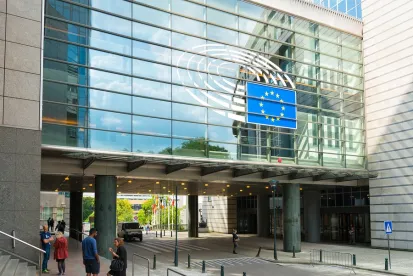ANTITRUST AND COMPETITION
European Commission Blocks a Global Transaction Involving Two Leading South Korean Shipbuilders
On 12 November 2019, a South Korean leading shipbuilder (the Notifying Party) notified to the European Commission its proposed acquisition (the Proposed Transaction) of another South Korean shipbuilding company active worldwide (together, the Parties).
The European Commission examined the Proposed Transaction under Article 6(1) of EU Regulation No. 139/2004 (the EU Merger Regulation) and, 7 December 2019, prima facie found that the Proposed Transaction raised serious competition concerns as to its compatibility with EU merger control rules. Therefore, the European Commission opened an in-depth investigation (i.e. a Phase 2) to further assess whether the Proposed Transaction could negatively affect competition.
On 13 January 2022, the European Commission, pursuant to Article 8(3) of the EU Merger Regulation, issued a decision prohibiting the Proposed Transaction (the Decision). The European Commission found that the Proposed Transaction, if completed, would have significantly impeded effective competition in the worldwide market for the construction of large liquefied gas (LNG) carriers as a result of the creation of a dominant position. In particular, that dominant position would have reduced the choice in suppliers and led to higher prices to the detriment of European customers.
The European Commission took the view that: (i) the Parties held significant market shares (above 60%) in a high concentrated market, (ii) a small number of competitors operated in such market (in addition to the Parties, only one large competitor would have been left on the market, together with other small players unable to compete with the combined entity post-transaction), and (iii) the manufacturing of LNG carriers market is highly sophisticated, with high barriers to entry and no buyer power.
The Notifying Party is evaluating whether to appeal the Decision before the General Court of the European Union. It is worth noting that the European Commission’s investigation lasted a substantial amount of time (more than two years), and the same transaction had been unconditionally cleared in China and Singapore. This, coupled with the other European Commission prohibition decisions in Tata Steel/ThyssenKrupp and Siemens/Alstom, sends a stark reminder to businesses globally about the need to ensure an effective global filing strategy, including the importance of crafting remedies that can adequately frontload transaction timeline risks.
DIGITAL AFFAIRS
The European Parliament Adopts Its Position on the Digital Services Act
On 20 January 2022, the European Parliament’s plenary adopted its position on the Digital Services Act (DSA), the legislative proposal aimed to counter illegal content online and to increase accountability for providers of intermediary services (in particular online platforms). The Internal Market and Consumer Protection Committee’s report on the proposal, authored by rapporteur Christel Schaldemose (S&D, Denmark), was supported by 530 votes in favor to 78 votes against, with 80 abstentions.
Members of the European Parliament (MEPs) introduced important changes to the European Commission’s original proposal: a ban on advertisements targeting minors, easier mechanisms for refusing consent for processing personal data, and de-penalizing refusal to give such consent. If the consent is refused or withdrawn, recipients will be given other options to access the online platform, including options based on tracking-free advertising. The use of specific techniques to extort consent or collect personal data, known as “dark patterns,” would be forbidden.
MEPs also suggested strengthening the obligation to trace traders (known as the “Know Your Business Customer” principle), proposed exempting micro and small enterprises from certain DSA obligations, and introduced the right to use and pay for digital services anonymously. Very large online platforms will be subject to specific obligations, and they will be obliged to provide at least one recommender system not based on profiling. Finally, recipients of digital services and organizations representing them will be able to seek redress for any damages resulting from providers not respecting their due diligence obligations.
The text will be the European Parliament’s position in the negotiations on the final DSA text with the Council of the European Union, which represents EU member states and adopted its position already in November 2021.
ECONOMIC AND FINANCIAL AFFAIRS
FSB Reports on Global Trends, Risks and Innovations in the NBFI Sector
On 16 December 2021, the Financial Stability Board (FSB) published its 2021 Global Monitoring Report on Non-Bank Financial Intermediation (NBFI), presenting the results of the 11th annual FSB monitoring exercise, which assessed global trends, risks, and innovations in the NBFI sector for the year ending 31 December 2020 across 29 jurisdictions that account for approximately 80% of global gross domestic product. Hence, the report looks at those developments in light of both the impact of the COVID-19 pandemic and the extraordinary steps taken by authorities to stabilize financial markets and support the financing of the real economy.
The FSB has created the NBFI monitoring exercise as a means to identify the build up of vulnerabilities in NBFI and initiate corrective actions where necessary. Compared to past exercises, this monitoring exercise contains more details on money market funds (MMFs), which in turn provide for a better understanding of how trends and risk profiles differ across MMFs that primarily invest in short-term government securities and those invest in nongovernment or longer-maturity securities.
In particular, this report describes: (i) trends across financial sectors and jurisdictions and developments in the NBFI sector in the broader context of aggregate developments in financial intermediation, (ii) direct interconnectedness among financial sectors, and (iii) the FSB’s process for calculating the “narrow measure” of NBFI according to five economic functions set out in the FSB monitoring approach—focusing on those activities that may engender vulnerabilities through liquidity/maturity transformation or leverage. Specifically, the FSB recognizes a decline in the NBFI sector’s relative share of total global financial assets, which decreased from 49.7% in 2019 to 48.3% in 2020, partially due to the impact of the pandemic and the correspondent monetary and fiscal responses. At the same time, whereas as a percentage of bank assets, banks’ liabilities to the NBFI sector were lower in 2020 than in previous years, banks continue to be net recipients of funding from NBFI entities. Although the narrow measure of NBFI also decreased slightly from 14.1% in 2019 to 13.7% in 2020 as a share of total global financial assets, it grew by 7.4% to 63.2 trillion in 2020—driven mainly by collective investment vehicles with features that make them susceptible to runs, which grew by 9% in 2020. On a general note, the FSB finds that balance sheet measures of vulnerability in NBFI appear to be overall stable, despite substantial volatility in financial markets observed during the first half of 2020.
In addition to the findings above, the FSB stresses the need to enhance data availability and the quality of data to facilitate the detection of vulnerabilities in the NBFI sector. Moving forward, the FSB will deliberate whether to refine indicators of vulnerabilities in certain NBFI segments or activities, taking into account lessons learned from the pandemic.
European Commission Presents Its Taxonomy Complementary Climate Delegated Act
On 2 February 2022, the European Commission approved in principle a Taxonomy Complementary Climate Delegated Act (Complementary Delegated Act), which includes, under strict conditions, certain natural gas and nuclear energy activities in the list of economic activities covered by the EU Taxonomy. The European Parliament and the Council of the European Union will have four months to scrutinize the document, with the possibility of requesting two additional months.
The European Commission has previously conducted consultations with the Member States Expert Group on Sustainable Finance and the Platform on Sustainable Finance on a draft text of the Complementary Delegated Act. Adjustments to the technical screening criteria and disclosure and verification requirements have since been introduced in the revised text to reinforce clarity and usability. The European Commission has also taken note of criticism expressed in some feedback, including the Platform on Sustainable Finance’s response (dated 21 January 2022), according to which the inclusion of nuclear and natural gas activities in the EU Taxonomy is not in line with Regulation (EU) 2020/852 (the Taxonomy Regulation). The contention concerns both the substantial contribution to climate change mitigation and the “do no significant harm” performance requirements with respect to the other environmental objectives. The European Commission, however, rejects the criticism on the ground that, in accordance with the Taxonomy Regulation, it is required to set out technical screening criteria for economic activities for which at present there is no technologically and economically feasible low-carbon alternative, which would be necessary in transition towards climate neutrality.
The EU Taxonomy entails a common classification of economic activities significantly contributing to environmental objects according to science-based criteria. While Commission Delegated Regulation (EU) 2021/2139 (the Taxonomy Climate Delegated Act) specifies the technical screening criteria for economic activities that have the potential to contribute to climate change mitigation and climate change adaptation in most sectors, Commission Delegated Regulation (EU) 2021/2178 (the Taxonomy Disclosures Delegated Act) defines the content, methodology, and presentation of the information to be disclosed by both nonfinancial and financial undertakings required to report about the alignment of their activities with the EU Taxonomy. Accordingly, this Complementary Delegated Act provides technical screening criteria for additional economic activities in areas that have not been included in the Taxonomy Climate Delegated Act, in particular specific activities in the natural gas and nuclear energy sectors, and it amends the Taxonomy Disclosures Delegated Act by prescribing specific disclosure requirements for the natural gas and nuclear energy sectors to ensure transparency and to allow investors to identify if and to what extent nuclear or natural gas activities are included.
ENVIRONMENTAL AFFAIRS
Carbon Border Adjustment Mechanism; Current Discussion at the European Parliament Regarding the New Legislative Proposal
In the context of the European Green Deal initiative, the European Commission has published a proposal for a regulation establishing a Carbon Border Adjustment Mechanism (CBAM), to be part of the “Fit for 55” package.
The main goal of the CBAM is to prevent carbon leakage by imposing a carbon tariff to products imported into the European Union. The initial proposal only covers the following sectors: electricity, cement, aluminum, fertilizers, and iron and steel.
The current mechanism in place, the Emissions Trade System (ETS), already focuses on preventing carbon leakage. However, it is considered to have reduced the incentive to invest in greener production within the European Union and abroad. Thus, the CBAM aims to progressively replace the ETS in the field of carbon emissions and to be fully implemented as from 2026.
Following the draft report by the European Parliament's Committee on Environment, Public Health and Food Safety (ENVI Committee) (leading the file in the European Parliament), the impacted industry, as well as members of the European Parliament’s Committee on International Trade (INTA Committee), voiced concerns regarding the effect this levy can have on EU exports. Manufacturers worry that it will leave them at a disadvantage in export markets where the CBAM is not applicable, as the effect of the tariff does not go beyond EU borders.
The possibility of an export rebate is now being discussed in the INTA Committee (that shares competence with the ENVI Committee on the file). Karin Karlsbro, rapporteur on the file for the INTA Committee, states that the European Union should never be tempted to subsidize emissions in relation to exports out of the European Union, notwithstanding the fact that such measure is likely to be incompatible with the World Trade Organization (WTO) rule. Socialists and Democrats, along with the Greens, support the leading figure of the committee, whereas the right-wing Identity and Democracy Group and the European People’s Party say the export rebates will be compatible with WTO rules and need to be supported, short of which the EU industry will not be able to compete with foreign companies.
The INTA Committee’s vote on the file, which will inform the position of the ENVI Committee, is scheduled for 28 February 2021.
Green Label for Nuclear and Natural Gas Projects Under Draft EU Taxonomy Rules
The Complementary Delegated Act introduces additional economic activities from the energy sector into the EU Taxonomy. The text sets out clear and strict conditions, under Article 10(2) of the Taxonomy Regulation, subject to which certain nuclear and gas activities can be added as “transitional” activities to those already covered by the first Complementary Delegated Act on climate mitigation and adaptation, applicable since 1 January 2022.
The European Commission has concluded that nuclear energy, subject to strict safety and environmental conditions (including on waste disposal) that ensure the respect of the “do no significant harm principle,” can play a role in the transition towards climate neutrality in line with the European Green Deal.
Natural gas investment is also included in the green label as a “transitional” energy, provided that it meets a detailed set of conditions, including producing emissions less than 270g of CO2 per kilowatt hour (for new gas plants approved before the end of 2030) and provided that it is replacing traditional fossil fuels, such as coal generation.
In terms of next steps, once translated into all official EU languages, the Complementary Delegated Act will be formally transmitted to the co-legislators for their scrutiny. Once the scrutiny period is over, and if neither of the co-legislators objects, the Complementary Delegated Act will enter into force and apply as of 1 January 2023.
European Commission Proposes to Strengthen the Protection of the Environment Through Criminal Law
On 15 December 2021, the European Commission adopted a Proposal for a new EU Directive (Proposal) to fight environmental crime, replacing the 2008 Environmental Crime Directive. The Proposal is part of a wider package of initiatives under the European Green Deal, and it aims to improve legal certainty and effectiveness of the EU environmental crime framework.
The Proposal defines new categories of environmental criminal offenses, including illegal timber trade, illegal ship recycling or illegal abstraction of water, serious breaches of EU chemicals legislation, or source discharge of polluting substances from ships. In addition, the Proposal clarifies existing undefined terms of environmental crime in the current directive, for instance, the definition of “substantial damage.”
The European Commission proposes to set a common minimum denominator for sanctions for environmental crimes to ensure that environmental crimes are punishable by effective, proportionate, and dissuasive criminal penalties. The proposal requires that member states introduce specific sanction levels and types for environmental criminal offenses, where the categorization proposed reflects the seriousness of the offenses. For example, where offenses cause or are likely to cause death or serious injury to any person, member states have to provide for imprisonment of up to 10 years. The Proposal also introduces accessory sanctions, including the restoration of nature, exclusion from access to public funding, and procurement procedures or the withdrawal of administrative permits. In regard to sanctions for legal persons, the Proposal provides that member states may introduce sanctions of a noncriminal nature. To ensure that punishment is effective, proportionate, and appropriate, mitigating and aggravating circumstances are also proposed.
The Proposal also aims at strengthening the effectiveness of law enforcement cooperation and at making relevant investigations and criminal proceedings more effective. In particular, the Proposal includes obligations for member states to provide for adequate support of inspectors, police, prosecutors, and judges through training, resources, coordination, cooperation, and information sharing among enforcers.
The Proposal will now be submitted to the European Parliament and the Council of the European Union to undergo the ordinary legislative procedure.
TRADE
European Parliament’s Draft Report on Foreign Subsidies Distorting the Internal Market
On 18 December 2021, the INTA Committee released its draft report on the European Commission’s proposal for a regulation on foreign subsidies distorting the internal market (titled the “Proposal for a Regulation of the European Parliament and of the Council on Foreign Subsidies Distorting the Internal Market”). So far, no specific EU rules addressing distortion on the single market caused by foreign subsidies exist.
The European Commission’s proposal to address potential disruptive effects of foreign subsidies was published on 5 May 2021. The proposal aims to address unfair advantages that foreign companies might have, due to foreign subsidies, when acquiring EU companies, participating in public procurements in the European Union, or engaging in other commercial activities in the European Union.
In the European Parliament, the file is allocated to the INTA Committee. MEP Christophe Hansen (EPP, Luxembourg) is appointed as the rapporteur. In his draft report, he welcomes the progress made in the European Commission’s proposal and suggests considering a foreign company’s abuse of dominant position in its home market as financial contribution in terms of foreign subsidies as well. The rapporteur also suggests that future foreign subsidies be reported under the instrument, as well as clarifying that whenever a third country is found to have a subsidy control mechanism that is equivalent to the European Union’s mechanism in law and practice (notably the EU state aid rules), foreign subsidies provided by such countries may be considered unlikely to be distortive.
The European Parliament has yet to adopt its position. This will happen after further discussions within the INTA Committee, following input from other relevant committees. Together with the Council of the European Union, the European Parliament will ultimately adopt the legislation in accordance with the so-called ordinary legislative procedure. The French presidency program states that discussions on the proposal will be among its priorities.






 />i
/>i
